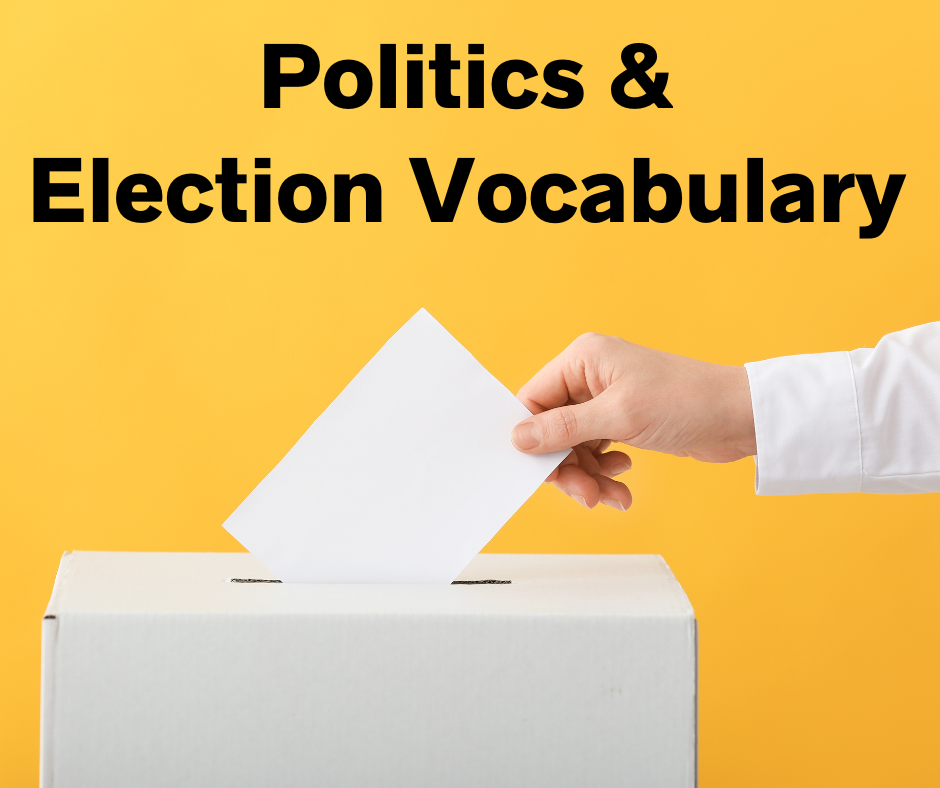
We’re recording this podcast in the year 2024, when more people than ever before in history will be voting in national elections.
At least 64 countries (plus the European Union), which represents about 49% of the people in the world, are choosing their leaders. So, we thought we should talk about it and look at some useful vocabulary connected to elections.
Google Podcasts has gone away. We hope that the over 12,000 of you are still with us.If you have an Android phone, and you’re looking for a new app, we suggest https://pocketcasts.com/ or https://podcastaddict.com/
Voice message from Andrés from Colombia.
“The sale has been forbidden for a long time.”
“it blew my mind”
Strange and Unusual Laws: https://inglespodcast.com/523
Voice message from Walter from Belgium
XHowX What do we call the room where we go to vote?
We have spoken about politics before: Politics and Government
https://inglespodcast.com/89
Brexit: https://inglespodcast.com/342

https://www.englishcraig.com/
Vocabulary
To be elected to office / To be voted into office
To hold/have an election
To stand for (or to run for) office/prime minister/president/the presidency
To vote / cast a vote
National election(s) = general election(s) / regional elections / local (council) elections
Electorate: All the people in a country or area who are entitled to vote in an election.
Example: “The electorate will decide the next president.”
Ballot: A process of voting, in writing and typically in secret. To cast a ballot (paper)
Example: “Voters cast their ballots in the election.”
To spoil a ballot (paper): To write/do something so that the ballot paper is null/void
Ballot box: the box where the ballot papers are placed by each voter
Constituency: A body of voters in a specified area who elect a representative.
Incumbent: The current holder of a political office.
Example: “The incumbent president is running for re-election.”
Polling Station: A place where voters go to cast their votes in an election.
Polling booth: a compartment in which one voter at a time stands to mark their ballot paper
Example: After coming ou t of the polling booth with her ballot paper ready, she placed it in the ballot box.
Turnout: The number of people who vote in an election.
Example: “Voter turnout was higher than expected.”
Landslide: An overwhelming majority of votes for one party or candidate in an election.
Example: “The candidate won by a landslide.”
Proportional representation / two-party system
Political parties: Labour/ Conservatives/ Republicans/ Democrats/ Socialists / Social Democrats/ Christian Democrats/ Communists/ Liberals/ Nationalists/ Left-wing/right-wing/ Hard right/left/ Extreme right/left / Centre parties /Greens
To concede defeat / to announce the winner / to inaugurate the new president / acceptance speech
Jobs: PM, MP, President, Leader of the X party, Vice President, Deputy Prime Minister
To make/launch an election campaign / donors / to give speeches / to hold rallies / to go on a campaign tour / campaign slogans
Should any people be banned from voting?
…and now it’s your turn to practise your English.
Send us a voice message. https://www.speakpipe.com/inglespodcast
Send us an email with a comment or question to [email protected] or [email protected]
If you’re a Spanish speaker and you want to study for free, visit the mansioningles website and for paid eBooks and audios for self-study check out the online store: https://store.mansioningles.net/
Thank you to our Patreon supporters. Join our Patreon program for as little as $1.50 per month and you get instant access to the transcriptions of this podcast. https://www.patreon.com/inglespodcast
Welcome to our new Patreon supporters who have joined us this month:
Carlos Delgado
Maria
Jvilni
Federica Bozza
Cynthia Cepeda Cardenas
Israel Pinilla
Mª Eva Seral Carrasco
Anonymous
Carlos
In next week’s episode: Different Means of Transport: From Bicycles to High-Speed trains
If you enjoyed this podcast, please tell your friends.
The music in this podcast is by Pitx. The track is called ‘See You Later’



